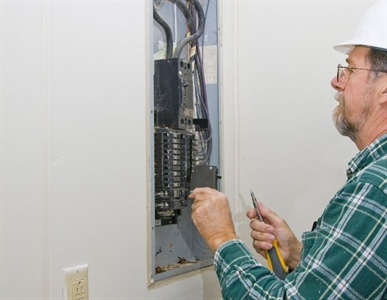What It Takes to Pass an Electrical Home Inspection

Electricity is one – if not the – greatest invention for modern-day living. The electrical system in your home is a complex network of wires and fuses snaking through the inner workings of your home.
But where there’s complexity, there are issues over time – especially if you’re planning to sell your home. So, before you get an electrical home inspection, you should be prepared.
Electrical Inspections: Assessing Safety & Compliance in Your Home
Electrical inspections are comprehensive checks of your home’s electrical components, including everything from the ground wire to the fuse box.
Faulty, broken, or damaged electrical components can have dangerous consequences, including electric shock and fire. Whether you are doing work on your home or buying or selling a house, you may be required to have an electrical inspection done.
One of the primary purposes of electrical inspections is to ensure the home is safe for its inhabitants. Having an inspection done can local potential hazards and give you time to repair those hazards before they erupt into something worse.
Here’s what it takes to pass!
Check Your Smoke & Carbon Monoxide Detectors
The first line of defense in fire and carbon monoxide poisoning is, of course, the detectors! The home inspector will check on these, so it’s a good idea to ensure they’re in working order.
Test your smoke and carbon monoxide detectors weekly to ensure they still run properly. If they are malfunctioning or not giving off an ear-piercing sound, purchase new detectors or replace the batteries before the inspection.
Check Circuit Breakers & Fuses
Frequently tripped circuit breakers and blown fuses mean improper amperage is being drawn to the circuit breaker, causing an overload. If this happens frequently, it’s best to reconsider the allocation of the flow from your appliances and direct them differently.
Before you schedule an inspection, you should also check your fuses and replace the ones that are blown out or malfunctioning.
Ensure Interior & Exterior Lights Are Functioning
To pass an electrical inspection, one of the most common components of pre-inspection is the functionality of your exterior and interior lights.
Make sure all your lights are in working order, and replace any light bulbs before the inspection. Having lights that are blown out not only looks bad, but it can also be dangerous – especially around stairs.
Check for Faulty Wiring
Faulty or outdated wiring can be a common problem in many older homes. Wiring will eventually succumb to general wear and tear, which can cause an arc fault, leading to a house fire.
If your electrical system is over 20 years old, many of your modern-day appliances will push it to the limit.
Checking for faulty wiring and learning the age of your electrical system is necessary to pass your next electrical inspection. Electrical problems commonly fail a home inspection, so ensuring your wiring is up to date is essential.
Check Outlets and GFCI Protection
Ground Fault Circuit Interrupters (GFCI) are safety devices usually placed where water is present, such as a bathroom sink or kitchen. These outlets must be appropriately grounded, functioning, and provide the correct voltage. Inspectors will ensure that GFCIs are present to help avoid electrical shock.
Ensure the Grounding System is in Place
Your home’s electrical system has a ground system. Grounding means your electrical system, devices, and metal enclosures are connected to the ground. The ground is an electrical conductor that carries fault current, signals, and radio waves.
This is important because if lighting strikes or a power line goes down, the electricity will pass through your house and into the ground rather than burn out all your appliances and wiring.
For an electrical inspection, confirm the proper installation of the grounding electrode.
Code Compliance
All work done in your home regarding your electrical system must adhere to the National Electric Code (NEC). In addition, you must meet all local codes, so if you are doing electrical work in your home, ensure you check that you are compliant.
Contact DMC for Your Electrical Inspection in Minnesota
DMC Home Inspections are the experts to trust when it comes to your next electrical home inspection!
As InterNACHI & ASHI certified home inspectors, we conduct a 150-point inspection on all parts of your home, including foundation inspection and plumbing inspection. We follow all guidelines and rules as part of our work as professional home inspectors, and with DMC Home Inspections, you are in good hands.
Schedule your inspection today, or give us a call at 612-310-1692!